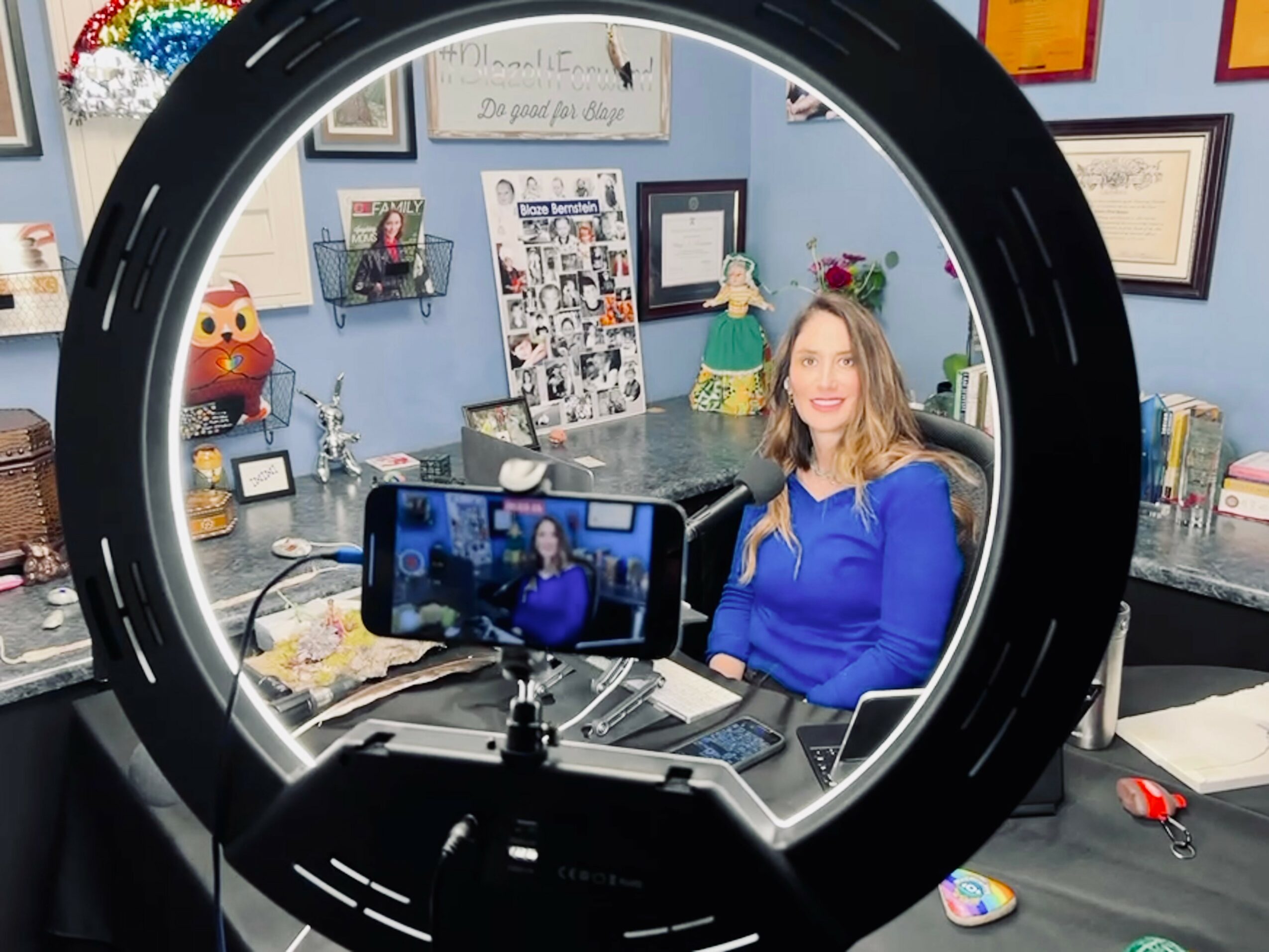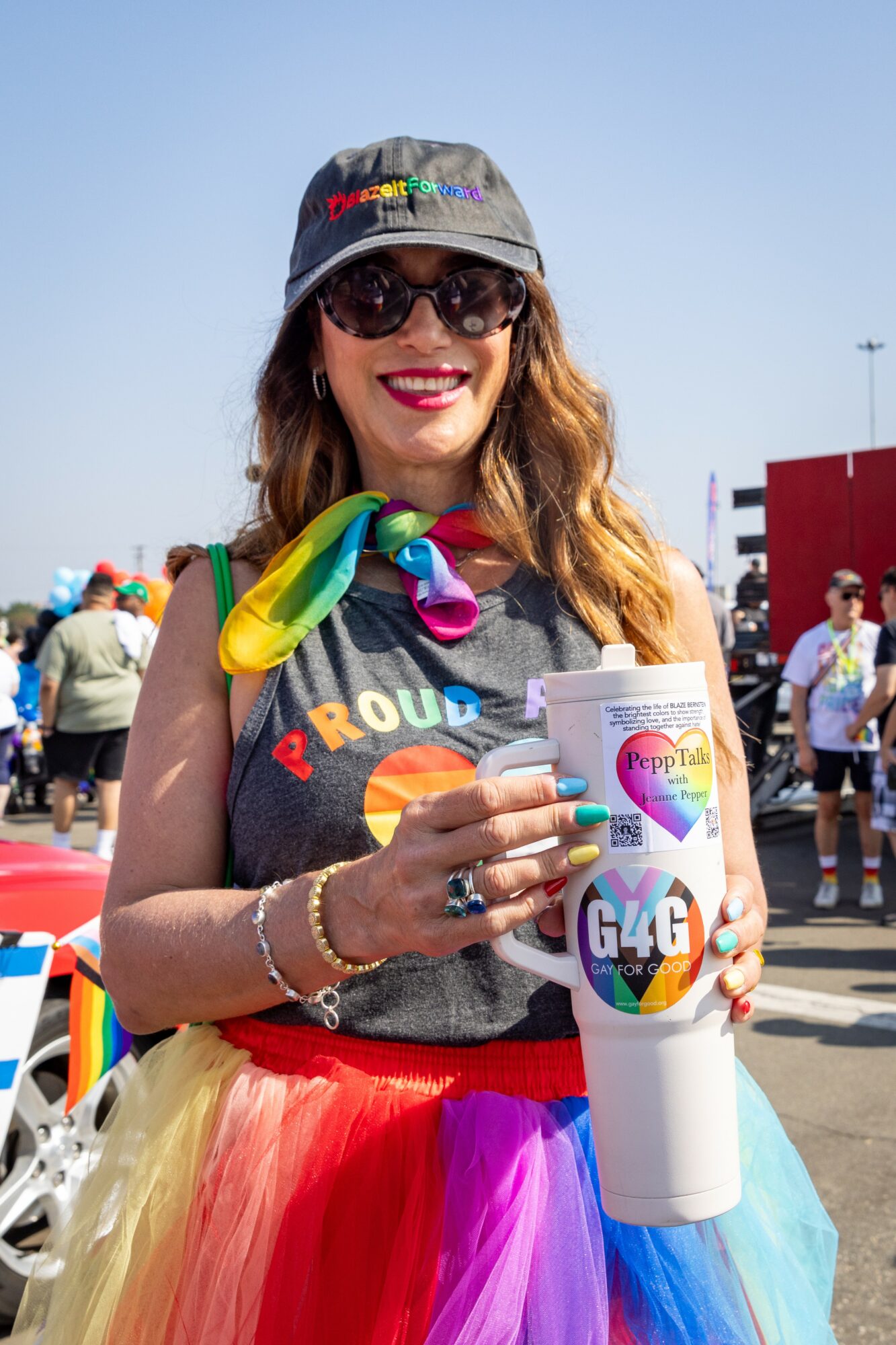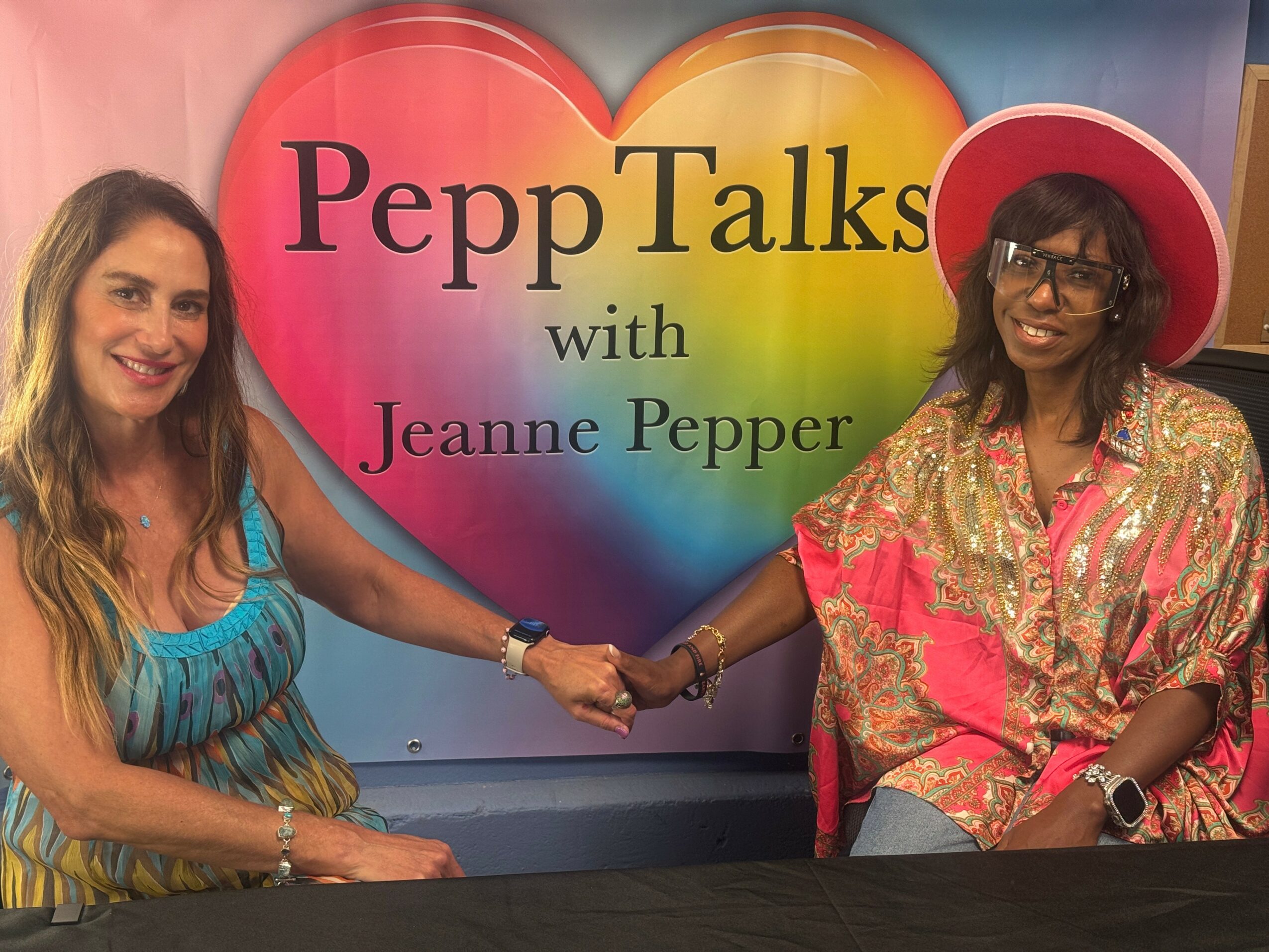

Today we’d like to introduce you to Jeanne Pepper.
Hi Jeanne, so excited to have you with us today. What can you tell us about your story?
My story starts right now, where I serve as an activist, writer, and host of the “PeppTalks with Jeanne Pepper” podcast. In this role, I’m primarily focused on amplifying stories of resilience and community, driven by the guiding principle to “repair the world.” I dive deep with everyday heroes, from mental health advocates to leaders fighting for children’s health and safety, all in service of encouraging intentional kindness—a mission I pursue through the #BlazeItForward movement and my inspiring podcast. How I got here really traces back to my early work as a lawyer. That career instilled in me the strategic thinking, analytical discipline, and powerful advocacy skills that are essential to my current mission. I stepped away from the active practice of law in 2000 to focus on raising my three children.
My life took an unexpected and seismic shift in 2018 with the tragic murder of my son, Blaze Bernstein, at the hands of a Nazi extremist. That event became the reluctant catalyst for my new calling. Rather than being paralyzed by the hate that took our child, my husband and I immediately channeled our efforts into creating a legacy of acceptance and community action. The platform we used to gather information during his disappearance organically became the #BlazeItForward movement—a group of over 34,000 members on Facebook dedicated to combating injustice and celebrating acts of kindness.
Today, I carry those legal and advocacy skills forward, using my writing, speaking, and podcasting to turn challenge into purpose. I see the next phase of my journey as expanding the reach of this message to a larger national audience, culminating in the creation of more positive content and most likely a documentary or book that will share these heroes’ stories and the power of the #BlazeItForward mission with a wider viewership/readership—a step that will allow me to leverage my platform to inspire even more people to choose kindness, courage, and active community engagement. That is the story that brings me to this conversation today.
Alright, so let’s dig a little deeper into the story – has it been an easy path overall and if not, what were the challenges you’ve had to overcome?
It would be generous to call the path to where I am today smooth; it was more like an obstacle course that demanded constant upskilling across completely unrelated disciplines. However, I now view those challenges not as setbacks, but as the essential, difficult training that forced me to become the multi-faceted builder and communicator needed to succeed. The stability and growth we have now are directly attributable to the lessons I learned during those periods of intense struggle.
The first major struggle was a necessity-driven deep dive into technical infrastructure. To control our narrative and content delivery, I had to become our in-house developer, which meant quickly learning web development skills to maintain, create and modify our websites for www.BlazeBernstein.org and www.PeppTalkswithJeanne.com . This was a steep learning curve of syntax, troubleshooting, and design principles.
Simultaneously, launching the podcast required me to understand and learn sound engineering optimization culminating in me building a recording studio in my home which then involved learning acoustics and creating a digital audio workstation. Furthermore, mastering the technical skills for interviewing both in house and remotely, traveling to conferences and speaking engagements meant constantly battling unexpected issues like microphone feedback and unfamiliar A/V setups—all while trying to maintain a professional, calm demeanor. This taught me the paramount importance of working with an amazing producer (Eli Moskowitz) preparation and redundancy.
The second, and perhaps more draining, struggle involved mastering the soft skills of content creation and outreach. Simply having the infrastructure wasn’t enough; I had to learn podcasting skills from scratch, which meant overcoming the initial awkwardness of interviewing, learning to guide conversations effectively, and most importantly, becoming proficient at connecting with great guests. That process involved meticulous research, networking, and scheduling.
Reaching an audience is the hardest part of this and required an entirely separate skill set. The struggles here were in mastering the endless cycle of marketing and social media—learning platform algorithms, creating consistent content calendars, and navigating the mental toll of performance metrics and online noise. The combination of self-producing technical content while trying to be a public-facing personality and a tireless marketer was the definition of constant, high-pressure effort.
The turning point was recognizing that my true strength wasn’t becoming a master developer or a master marketer, but becoming a master integrator. The struggles taught me that these seemingly disparate skills—the technical acumen of a developer, the creative empathy of an interviewer, and the strategic eye of a marketer—were not separate tasks, but interlocking systems. I learned to view every failure—a disconnected social media account, a missed social media trend, a failed marketing campaign —as immediate, actionable feedback. This forced adaptation, the continuous necessity to learn and combine complex roles, is what ultimately created a resilient, self-sufficient, and powerful platform.
So, while the road was challenging, full of late nights wrestling with self imposed deadlines and the quiet frustration of learning a new craft, the greatest reward is the holistic skill set forged in that pressure. The struggles taught me resourcefulness, the ability to be both the builder and the architect, and the resilience to step onto any stage, whether digital or physical, knowing I built the system that supports me.
As you know, we’re big fans of you and your work. For our readers who might not be as familiar what can you tell them about what you do?
I operate at the crucial intersection of creativity, advocacy, and personal narrative, driven by a commitment to equity, inclusion, and systemic change. My mission is fundamentally to transform the devastating personal tragedy of the 2018 hate crime and murder of my son, Blaze Bernstein, into a powerful, enduring force for social change that uplifts marginalized and unheard communities.
My core specialization is creativity based advocacy, focused on transforming communities by amplifying the voices of the marginalized and unheard. I execute this through three interconnected channels: 1. Legal and Legislative Action: Using my training as an attorney to watchdog proposed legislation and advise on policy changes that affect victims and their families. 2. Motivational Speaking and Narrative: Serving as a transformational speaker to share my journey, providing hope, challenging prejudice, and mobilizing communities to support inclusion and justice. 3. Content Platform (PeppTalks with Jeanne): Hosting a mission-driven podcast dedicated to creating positive content that amplifies unheard voices and celebrating community change-makers. The show interviews activists, thought leaders, and “everyday heroes” who are actively working to improve the human condition and fight for equity and kindness.
I am most proud of igniting and sustaining the #BlazeItForward Movement. This movement is the ultimate expression of purpose, translating tragedy into a powerful, sustained call for inclusion, tolerance, and respect for marginalized communities. My family created the #BlazeItForward campaign built on the belief that love is the answer to hate and that every voice deserves to be heard. The #BlazeItForward Movement is a kindness campaign that promotes these values in Blaze’s honor, serving as the foundation for our broader advocacy work. This movement also directly fueled the creation of the PeppTalks with Jeanne podcast. The podcast’s purpose is to amplify this core message by spotlighting the incredible people who are actively changing the world for the better. By focusing on heroes and their humanitarian causes, we consciously shift the narrative toward the power of kindness, community service, and fighting for marginalized youth and equity.
What fundamentally sets me apart is the fusion of Lived Experience, the Authority of an Attorney, and the Commitment to Creative Voice Amplification.
This synergy creates a uniquely powerful advocacy model focused on broad social impact. Credibility Born from Experience: My status as a survivor means my message carries unmatched empathy, credibility, and urgency when connecting with and advocating for the marginalized. Impact Defined by Law: My legal expertise ensures that the passion for protecting victims and their families is translated into keeping violent criminals in prison and vulnerable populations out of prison with the promotion of practical policies and systemic solutions. Scale Provided by Media: The PeppTalks with Jeanne podcast and speaking engagements provide the platform necessary to educate and mobilize a global community, transcending the courtroom to engage citizens and leaders alike on the importance of amplifying marginalized voices. I lead a life defined by the powerful intersection of. advocacy, creativity, and purposeful action to heal and reform the world using my unique abilities to give voice to the unheard.
Any advice for finding a mentor or networking in general?
My Best Advice: Turning Supporters into Mentors
The way I built my advocacy work and launched my podcast was not through cold-calling strangers. It was by activating a community of people who already believed in the cause.
For anyone looking to find a mentor or build a network, the secret is to stop networking and start leading a mission that people want to be part of.
1. The Strategy: Lead with a Moral Investment
Most people try to network by asking someone to invest their time (low value). My advice is to ask them to invest in your purpose (high value).
The Power of the “Why”: Before you ask anyone for anything, you must clearly and powerfully state the change you are trying to make in the world and why you are the person to do it. When you present a compelling “why,” you appeal to the philanthropic side of successful people—the part that wants to leave a positive legacy.
Don’t Ask for Advice; Ask for Collaboration: Never lead with the phrase, “Can you mentor me?” Instead, lead with: “I’m launching a movement to solve problem X, and I need your specific expertise to make it succeed.” This frames them as a crucial partner in an exciting project, not a free counselor.
2. The Practical Step: Mobilize Your “Warm” Network
You and I both know the easiest people to ask are the ones already in your corner. We were able to draw from a community of philanthropic friends—and that community already exists for you, too.
Look to Your Periphery: Your first and best mentors are usually one step removed from your inner circle. Think about the people you already know who fit these descriptions:
The Former Boss/Colleague: Someone who respected your work ethic in a previous role.
The University Alumni/Professor: Someone who believes in your intellectual potential.
The Community Leader: Someone at your religious organization, PTA, or local charity who trusts your character.
The “Beta-Test” Request: Approach these warm contacts first. Instead of asking them to be your lifelong mentor, ask them to be a “Beta-Tester” for your ideas.
Example: “I’m putting together a plan for a new advocacy initiative. Can I send you a one-page summary? I’d be grateful for 15 minutes of feedback on what you think I’m missing.” This is a low-commitment, high-value request that usually leads to a much deeper connection.
3. The Follow-Through: Become an Accountable Colleague
Once you get someone’s wisdom, you must prove that their investment in you was worth it. This is what turns a quick chat into a lasting advisory relationship.
Be a Great Student: If someone gives you an idea, act on it. Don’t just say, “That’s great.” Close the Loop (The Golden Rule): The moment you implement their advice and see a result—even a small one—send them a short email. Instead of: “Thank you for the advice.” Say: “I took your suggestion to re-format our presentation, and it resulted in us securing the donation. Your insight made that possible.” Showing them the tangible impact of their advice is the most valuable currency you can offer. It motivates them to help you again, often making them your most enthusiastic, long-term mentor.
Pricing:
- Public Speaking Engagements $5000-$10000
Contact Info:
- Website: https://Www.PepptalkswithJeanne.com
- Instagram: @PeppTalkswithJeanne
- Facebook: https://m.facebook.com/groups/blazeitforward/?ref=share&mibextid=wwXIfr
- LinkedIn: https://www.linkedin.com/in/jeanne-pepper-9305a8290?utm_source=share&utm_campaign=share_via&utm_content=profile&utm_medium=ios_app
- Youtube: https://youtube.com/@pepptalkswithjeanne?feature=shared
- Other: https://linktr.ee/PeppTalkswithJeanne?utm_source=qr_code







Image Credits
Eli Moskowitz (all photos)
@elijoelmos
[email protected]














